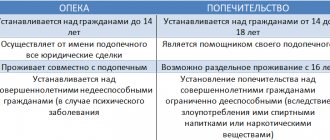1
The family form of placement implies the transfer of a minor left without parental care to the families of citizens for upbringing. This is one of the forms of protecting children's interests. A child has the right to be raised in a family, but sometimes blood parents pose a danger to his life and health.
Expert opinion
Stanislav Evseev
Lawyer. Experience 12 years. Specialization: civil, family, inheritance law.
After the minor is removed from his birth family, he is transferred to the care of the district guardianship department. Specialists take measures for the child’s family placement within 30 days. Otherwise, he is sent under supervision to a specialized organization. A citizen who wishes to adopt a minor must collect a list of documents provided for by Decree of the Government of the Russian Federation No. 423 of 2009. An additional condition is the completion of training at a school for foster families.
Basic Concepts
Before looking for differences in these two concepts, you must first understand what they mean.
Guardianship
This is a form of placing a child under 14 years of age in a family for the purpose of developing and educating the ward in case of incapacity or absence of parents. When the ward reaches the age of 14 years, guardianship is replaced by guardianship.
Adoption
This is a form of placing children under the age of 18 in a family who have been deprived of parental care and have the same rights as natural children.
How to make the right decision
Each form of relationship between adults and children has its positive and negative sides. Thus, the adopted child receives all rights, including inheritance, on an equal basis with biological children.
Among the disadvantages are the complexity of the procedure and the lack of impressive benefits that caregivers receive.
Pros of guardianship:
- availability of state support;
- maintaining child support from parents;
- children's right to real estate upon reaching 18 years of age.
Significant disadvantages are the strict monthly control of the PLO over the expenses of benefits (stacks of reports). The opportunity for a child to communicate with his relatives (not always socially prosperous), the absence of secrecy in transferring into guardianship.
What is the difference between guardianship and adoption?
Now let's figure out what the main differences between guardianship and adoption are.
| Guardianship | Adoption |
|
|
Separately, I would like to highlight such a form of guardianship as trusteeship. It is issued when the child reaches 14 years of age. Unlike guardianship, during guardianship the rights and responsibilities of the trustee are narrower; he only gives permission to carry out transactions.
Briefly about guardianship
The most popular form of placement for orphans in Russia is guardianship (Chapter 20 of the RF IC). It is established for minors aged 0 to 13 years. The main condition for the appointment of guardianship is that the child has no parents or is unable to fulfill their duties.
Grounds for appointing guardianship
| No. | Situation with parents |
| 1 | Died |
| 2 | Incompetent |
| 3 | Deprived/limited rights to the child |
| 4 | A refusal was issued at the maternity hospital |
| 5 | They refused to take children from a specialized organization |
| 6 | Avoid fulfilling responsibilities towards children |
| 7 | Endangered the life and/or health of a minor |
| 8 | Committed a crime against a child |
| 9 | Serving a sentence according to a court verdict |
Important! The district guardianship department at the place of residence of the minor assigns him the status of a child deprived of parental care. Transferring children without status to a foster family is prohibited.
Guardianship is provided free of charge or for a fee. Free guardianship is assigned to relatives. Paid guardianship is carried out under a foster family agreement and is considered a professional form of placement.
Guardianship is appointed by a resolution of the district guardianship department for a certain period. As a rule, until the ward’s eighteenth birthday.
The guardian bears full responsibility for the safety of the child's property. He receives and spends the money of the ward (benefits, alimony, pension) for the needs of the ward. The citizen annually reports for the expenses made to the regulatory authority.
A minor has the right to have one guardian. The appointment of the second is provided for by law in exceptional cases. Therefore, when living in a foster family, only the guardian has rights and responsibilities in relation to the child. His spouse has no right to represent the interests of the ward.
Rights and responsibilities of adoptive parents and guardians
For guardians:
| Rights | Responsibilities |
|
|
For adoptive parents:
| Rights | Responsibilities |
|
|
Reasons why you cannot adopt
When it comes to the question of which children can be taken into custody and which ones can be adopted, the guardianship authorities are not always right.
One of the main reasons why you cannot adopt is that guardianship authorities quite often try to play it safe. But any child who has lost his parents can be placed under guardianship.
The term and conditions of family arrangement will depend on the specific situation.
Because it is one thing when the mother is in prison or undergoing long-term treatment, and another when she left the child and disappeared.
If a child is in an orphanage, it means he is left without parental care and a family arrangement is possible. There are some restrictions on the ability to be adopted. Therefore, such issues are resolved in court.
You can adopt in the following cases:
- When the child’s parents are unknown, and he himself was abandoned without documents. The police draw up an act of adoption and adoption is possible immediately.
- The child's parents died. A death certificate is the main reason for adoption.
- The parents were recognized by the court as missing or dead. With a court decision, adoption is possible immediately.
- If parents are declared legally incompetent.
- Parents are deprived of parental rights more than six months before the adoption decision is made. During this time, they have the right to regain parental rights and prove in court that they are worthy of it.
- The parents gave their consent to the adoption.
- If parents, without good reason, do not live with the child for more than 6 months and do not take part in his upbringing and maintenance.
There are some factors that do not allow you to give up a child for adoption. For example, when parents are in prison or undergoing long-term treatment.
This also applies to the temporary placement of a child in orphanages on the initiative of the parents. At the same time, parents learn about the child, constantly come to visit and send gifts.
Sometimes this is done by people who go to work in other countries and do not have relatives with whom they could leave their children.
The main problem when it is impossible to adopt is that the parents leave the child in the care of the state with a promise to pick them up, but do not call or visit.
As a result, candidates for adoption are unable to take the child, and his journey home stretches for months or years.
Thus, the child remains in the orphanage for an indefinite period of time.
Differences in adoption and guardianship procedures
Of course, the adoption and guardianship procedure has its own differences and features.
Forms
| U | ABOUT |
|
|
Stages of the document submission procedure:
| U | ABOUT |
|
|
Guardianship and trusteeship of a child: features
Guardianship is one of the forms of placing children under 14 years of age without the guardianship of biological parents into families on the basis of an agreement concluded with the Public Educational Institution. If the child is over 14 years old, guardianship is established. The main goal of guardianship is to provide the minor with optimal upbringing, maintenance and protection by adults, and the formation of a normal idea of life. Raising in an orphanage does not guarantee this, and the best option for a child is a family.
Legally, the guardian is not a parent, but performs all his functions, and receives monetary compensation for this in the form of benefits from the state. According to Art. 25 Federal Law dated April 24, 2008 No. 48-FZ, he is obliged no later than February 1 of the year following the reporting year to provide documents on the storage and use of the ward’s property and the intended use of funds allocated for it.
Points that are important to consider for future guardians:
- Guardianship is established taking into account the opinion of the child. If he is over 10 years old, his consent is required;
- Brothers and sisters cannot be placed under guardianship if this violates their interests and they agree to the separation;
- The obligations of the guardian arise from the moment the decision of the OOiP on the appointment is formalized. Benefits are issued after the conclusion of the contract.
Note! Requirements are established for guardians, if not met, the OOiP will not approve the execution of the contract.
Requirements for guardians and trustees
According to Art. 146 of the RF IC, adult capable citizens with a permanent source of income can take custody of children.
The contract is not concluded with individuals:
- Deprived of parental rights;
- Convicted for crimes against life and health, against sexual integrity, grave and especially grave acts;
- Those who have not been trained in guardian courses;
- Those in a same-sex marriage;
- Drug addicts, alcoholics;
- Suffering from serious illnesses;
- Those removed from guardianship due to their own fault;
- Limited parental rights.
The relatives of the child left without parents have the priority right to custody. If the guardians are not officially married, one child is not transferred to the guardianship of two adults.
If the application for guardianship is submitted by one of the spouses, the written consent of the other will be required.
Guardianship with living parents
Guardianship of a child who has parents is permitted in several situations:
- Limited or complete incapacity of parents;
- Mother and father living in another city or country;
- Lack of financial ability for spouses to support a minor.
If the mother and father are not deprived of their rights to the child, their consent will be required to determine custody.
What to choose: guardianship or adoption
Undoubtedly, every person who has decided to do a good deed by taking a baby from an orphanage will be faced with the choice of obtaining guardianship or adopting a child.
Pros and cons of guardianship:
| Positive factors | Negative factors |
|
|
Pros and cons of adoption:
| Positive factors | Negative factors |
|
|
Pros and cons of this form
Guardianship has the following advantages:
- the decision is made by the leadership of local authorities, because of this the registration process is faster than with adoption;
- lower requirements regarding housing and wages are put forward to the guardian than to the adoptive parents;
- for a child under guardianship, the state pays benefits, helps with rest, placement for education and treatment;
- After the child reaches 18 years of age, if he does not have housing, the state provides living space.
The disadvantages of guardianship are:
- the person being brought up does not feel like a full member of the family;
- the child’s relatives can see him and sometimes take him back;
- Third parties have the right to adopt a child;
- You cannot change personal data – date of birth and full name.
Adoption has the following advantages:
- the child feels like a member of the family;
- after he reaches 18 years of age, all rights and inheritance relations are preserved;
- The adopted person can change personal data – place and date of birth, full name;
- The law protects the secrecy of adoption.
Disadvantages of the device form:
- a court decision is required, i.e. the registration process takes longer than guardianship;
- all responsibilities for providing for the child lie only with the newly acquired parents;
- quite high requirements for housing and salaries of adoptive parents;
- Not all children left without parental care can be adopted.
Payments and benefits to guardians and adoptive parents
In Russia, adoption is a free process, since the child is a full member and heir of the family, therefore he is not entitled to payments and benefits. Unlike adoption, guardianship is supported financially by the state.
There are three types of payments:
- One-time benefit, which is 16,350 rubles
- Monthly allowance (amount varies depending on the region). The average is:
- For children under 12 years old – 15 thousand rubles
- For children over 12 years old - 20 thousand rubles
- For children with disabilities – 25 thousand rubles
- Guardian's remuneration (paid monthly):
- Up to 3 years – 12650 rubles
- Over 3 years – 9200 rubles
- For children with disabilities – 25 thousand rubles
Guardians also have the right to benefits:
- Tax benefits:
- For a student with disabilities – 6 thousand rubles
- For one ward – 1400 rubles
- For two children – 2800 rubles
- For three children – 5800 rubles
- Tax deductions equal to the amount spent on treatment or education of the ward.
- Labor benefits:
- The right to an additional two weeks of leave once a year
- The right to work part-time or a week
- May refuse to work on weekends, holidays, and may also refuse to travel if the child is under five years old
- Can take paid leave if the ward is under 1.5 years old.
- If the ward is disabled:
- Entitled to 4 additional days off
- Additionally, compensation in the amount of 5,500 rubles is allocated, which is additionally issued by the Pension Fund.
Features of guardianship
Guardianship implies the non-finality of the measure, i.e. valid for a certain period of time. Termination of guardianship may be due to the following circumstances:
- Parents who were considered missing have been found.
- The biological parents achieved the restoration of their rights.
- A family member (father or mother) recovered and became capable.
- Instead of guardianship, other applicants declared their readiness to adopt.
- The attitude of the guardian was not conscientious and responsible for the past period.
Guardianship presupposes strict supervision by a monitoring organization that monitors compliance with norms and laws in the process of the guardian taking steps to raise, provide education, and support the child. At certain intervals, the guardian reports on the management of financial resources allocated for the child (annual or quarterly report).
You should know the difference between organizing life under guardianship and adoption. Unlike an adopted child, the guardian's pupil will know that the latter is not his parent, and the fact of living together is only a temporary measure.
The basic way of life does not change and basic personal data - last name, first name, the right to meet relatives remain in force.
The legal aspects of guardianship have the following characteristics:
- Simple paperwork (the procedure is less complicated than adoption).
- The basis for recognition of guardianship will be the conclusion of an agreement and the drawing up of an act with the guardian, with the assignment of material support implemented by the state, the collection of alimony, the assignment of a pension with the expenditure of funds for treatment, education, and the current needs of the child.
- The state provides a number of benefits, including resolving housing issues when the ward reaches the age of majority (in the absence of real estate ownership).
- The agreement with the guardian has a retroactive effect when it is not possible to find a common language with the pupil.
- The most common case of guardianship is the situation when an orphaned relative is taken into care by immediate relatives or persons from a close family circle.
By registering guardianship, a person takes responsibility for his pupil.
Guardianship responsibilities include:
- Raising a minor in accordance with accepted basic values and norms of family law.
- Cohabitation.
- Assisting students in realizing their rights, responsibilities, and protecting their interests.
- Informing the guardianship authorities about the change of residence of the ward.
- Continuation of the function of a guardian upon departure of a pupil for further education, in the event of deprivation of liberty, or referral to inpatient treatment.
A special act signed when establishing guardianship may indicate actions prohibited in relation to the ward.
The following rights are often among the permitted actions::
- act as the legal representative of a minor in official bodies, including the court, without the need to issue a power of attorney;
- choose educational measures in relation to the ward, based on the interests of the child and the recommendations of the relevant government agencies;
- determine the place and what the child’s education will be, taking into account the opinion of the child being educated;
- make decisions that directly affect the life of a minor;
- in case of illegal retention by unauthorized persons, demand a return.
Adoption as a priority form of placement for children left without parental care
Adoption is an individual permanent (indefinite) form of placement for children left without parental care. For convenience, the legislator combines the terms “adoption” and “adoption” into one – “adoption”.
Legal regulation of adoption relations is carried out on the basis of the norms of Chapter. 19 of the RF IC, the Federal Law “On the State Data Bank of Children Left Without Parental Care”, as well as the provisions of the Rules for the transfer of children for adoption and monitoring the conditions of their life and upbringing in adoptive families on the territory of the Russian Federation and some others regulatory legal acts. In addition, when studying issues related to adoption, one should take into account the explanations of the Plenum of the Supreme Court of the Russian Federation (Resolution of the Plenum of the Supreme Court of the Russian Federation dated April 20, 2006 No. 8 “On the application of legislation by courts when considering cases of adoption of children”).
Specifics of adoption as a form of placement of children
consists, firstly, in the perpetual nature of the legal relationship and, secondly, as a consequence, in the special legal connection between the adoptive parent and the adopted child, reminiscent of the connection between a parent and a child.
Indeed, adoption is carried out forever, whereas, for example, guardianship (trusteeship) terminates when the child acquires full civil capacity. The only exceptions are possible cases of cancellation of adoption.
During adoption, the rights and responsibilities of adopted children and adoptive parents are equal to the rights and responsibilities of children and parents. Thus, adoption is similar to first degree kinship. This feature of adoption is confirmed by the provisions on the secrecy of adoption (Article 139 of the Family Code). Unlike some other legal systems, domestic law considers adoption as a sacrament. As a rule, adopted children do not know about the lack of blood relationship with the adoptive parent, which brings kinship by origin and adoption closer together. In addition, the grounds for canceling adoption are in many ways similar to the grounds for depriving parents of parental rights. Like kinship of the first degree, adoption entails significant legal consequences - the adoption has the right to inherit from the adoptive parents (Article 1147 of the Civil Code), the right to use the residential premises of the owner-adopter (Article 137 of the Family Code; Article 31 of the Housing Code), etc.
The very serious consequences of adoption are due to the fact that adoption is carried out in court. This was not always the case, since Art. 98 CoBS of the RSFSR provided for the administrative procedure for adoption (“adoption is carried out by decree of the head of the district, city, district administration in the city”). Meanwhile, it is obvious that such phenomena in a child’s life as the appearance of new parents with whom he will be associated forever, as well as the final interruption of legal ties with blood parents, cannot be accompanied by an administrative form of decision-making. Modern standards for the implementation of human rights require the use of a judicial form of exercising the child’s right to live and be raised in a family, as well as judicial methods of protecting the rights of the child’s natural parent.
Traditionally, adoption is called the priority form of placement for children left without parental care.
The priority nature in this case means that when choosing a form of placement for a child, the most suitable of all is adoption. The priority of adoption is associated with the peculiarities of this phenomenon for Russian family law. From the point of view of Russian legislation, adoptive parents must accept the adopted child as their own and completely replace his parents. Therefore, in the Russian Federation there is no “trial” adoption or temporary adoption, a practice where adoptive parents experiment, trying to find a child for themselves, and children move from family to family. As a temporary arrangement, as mentioned above, Russian legislation considers the transfer of children into guardianship (trusteeship) or into a foster family.
The choice of form of placement for a child depends on many circumstances. In accordance with Art. 20 of the UN Convention on the Rights of the Child, the state, when providing a replacement for the child with his family environment, must take into account “the desirability of continuity in the upbringing of the child and his ethnic origin, religious and cultural affiliation and native language.” A similar rule is enshrined in paragraph 1 of Art. 123 RF IC. Clause 2 of Art. 124 of the Code additionally indicates that upon adoption, a child must be provided with the opportunity for full physical, mental, spiritual and moral development. One of the components of mental and spiritual development is the possibility of related communication with brothers and sisters. The law generally prohibits the adoption of brothers and sisters by different persons. However, the court may deviate from this rule if such adoption is in the best interests of the children. The Resolution of the Plenum of the Supreme Court of the Russian Federation dated April 20, 2006 No. 8 “On the application of legislation by courts when considering cases of adoption of children” explains that in cases where the adoptive parent does not request that the brothers or sisters of the child being adopted be transferred to him, adoption is permissible , if it meets the interests of the child (for example, children are not aware of their relationship, did not live and were not raised together, are in different organizations, cannot live and be raised together for health reasons).
Subjects of legal relations of adoption - adoptive parents and adoptees
. In relation to adoptive parents, the law makes many special requirements, but any minor children left without parental care can be adopted (Clause 1, Article 124 of the Family Code). However, it must be borne in mind that adoption is also possible for a child under the care of a parent. We are talking about the adoption of children by stepfathers or stepmothers, i.e. spouses of the child's parent. In this case, the relationship of raising someone else’s child is actually legitimized.
In order for the adoption to take place, the child must go through the registration procedure for children left without parental care (see § 1 of this chapter).
The state of a child’s health does not affect the exercise of his right to live and be raised in a family, so seriously ill children can also be adopted. Often, candidates for adoptive parents are denied adoption on the basis that the child has a serious illness. Such actions are contrary to the law.
A candidate for adoptive parents, like the person being adopted, also has a special legal status
. As part of his legal personality there is a special legal possibility - the right to be an adoptive parent. This opportunity is not inherent to all individuals, but only to those who meet the requirements established by law, the purpose of which is to provide the child accepted into the family with the opportunity for full physical, mental, spiritual and moral development.
Moreover, the legislator even mentions the preemptive right to adoption (clause 5 of Article 127 of the Family Code). Its subjects are the child’s relatives, and the condition for the implementation of this right is, of course, the observance of the interests of the child.
The current legislation imposes many requirements on the personality of a candidate for adoptive parents (Article 127 of the Family Code). Such requirements are related to the presence of a sufficient amount of legal capacity and capacity of the future adoptive parent, to his state of health, to his personal (moral) qualities, as well as to the so-called material and living conditions of the future adoptive parent. In addition, it is prohibited to be adoptive parents for those citizens who have not undergone special psychological, pedagogical and legal training (with the exception of close relatives of the child, as well as persons who are or were adoptive parents and in respect of whom the adoption has not been canceled, and persons who are or were guardians (trustees) of children and who were not suspended from performing their duties).
The Family Code also allows for some deviations from the strict rules on the selection of adoptive parents. For example, stepfathers and stepmothers who adopt stepsons or stepdaughters may earn less than required by law and are not required to undergo special training for adoption.
A special requirement for the identity of the adoptive parent is the condition regarding the age difference between the adoptive parent and the adopted child. In accordance with Russian legislation, the minimum age difference between the adoptive parent and the adopted child is 16 years. This rule is dictated by the main property of adoption - similarity to first-degree kinship.
Exceptions from it:
- there is no need to take into account the difference in age when adopting a child by a stepfather (stepmother), since the child lives with his parent and in fact already communicates with his stepfather or stepmother;
- for reasons recognized by the court as valid, the age difference may be reduced. In paragraph 8 of the above-mentioned Resolution of the Plenum of the Supreme Court of the Russian Federation of April 20, 2006 No. 8, courts are recommended to allow adoptions with an age difference of less than 16 years if the child feels a sense of attachment to the person who wants to adopt him, considers him his parent, etc. etc., and the adoptive parent will be able to provide the child with full physical, mental, spiritual and moral development.
Guardianship and trusteeship authorities are obliged, through their official websites and the media, to inform citizens about the adoption procedure and about children left without parental care who can be adopted, as well as to receive citizens wishing to adopt a child (children).
Adoption procedure
includes the following steps:
1. Submission by a person wishing to adopt a child of an application to the guardianship and trusteeship authority at his place of residence with a request to give an opinion on the possibility of becoming an adoptive parent. The application is accompanied by documents in accordance with the list established by clause 6 of the Rules for the transfer of children for adoption and monitoring the conditions of their life and upbringing in the families of adoptive parents on the territory of the Russian Federation.
2. Examination by the guardianship and trusteeship body of the applicant’s living conditions and preparation of a conclusion on the applicant’s ability to be an adoptive parent.
After receiving such a conclusion, the candidate for adoptive parents, who independently received information about the child whom he could adopt, has the right to apply to the court with an application for adoption (provided that there was personal communication between this candidate and the child).
At the same time, current legislation provides for the opportunity for a candidate adoptive parent to obtain information about children who may be adopted and to visit these children at their location.
3. An appeal from a candidate for adoptive parents to the regional or federal operator of a state bank about children left without parental care. In accordance with paragraph 4 of Art. 5 of the Federal Law “On the State Data Bank of Children Without Parental Care,” a citizen who wishes to adopt a child into his family provides information about himself to the regional or federal operator. The data bank operator documents information about citizens who wish to adopt children into their families in the form of a questionnaire, which indicates both information related to the identity of the applicant and information about the child whom the citizen would like to accept into his family ( Article 7 of the Law).
4. Selection of children suitable for the candidate adoptive parents. The data bank operator contacted by the candidate for adoption must provide all the information he has about children suitable for the applicant. If the information about any of the children suits the candidate for adoptive parents, then the operator of the children’s data bank issues him a referral to the organization in which the child is located to visit him. The guardianship and trusteeship authority at the actual location of the child left without parental care must be notified about the upcoming visit.
5. Visiting the child and personal communication with him (Clause 2 of Article 125 of the Family Code). In accordance with clause 12 of the Rules for transferring children for adoption and monitoring the conditions of their life and upbringing in adoptive families on the territory of the Russian Federation, the candidate for adoptive parents is obliged to personally get to know the child and establish contact with him, familiarize himself with the documents of the adopted child and confirm in writing the fact of familiarization with the medical report on the child’s health condition. If establishing contact with the child is impossible (due to his age or health condition), this nevertheless does not constitute an obstacle to adoption.
6. Application of a candidate for adoptive parents to the court with an application for adoption and judicial consideration of this application. Consideration of cases on the adoption of a child is carried out by the court in a special proceeding in accordance with the rules established by Chapter. 29 Code of Civil Procedure of the Russian Federation.
Adoption proceedings are not limited to the court reviewing the documents submitted by the applicant. In accordance with paragraph 2 of Art. 272 of the Code of Civil Procedure of the Russian Federation, the guardianship and trusteeship authority provides additional information to the court. Moreover, participation in the court hearing by representatives of this body (as well as the candidate for adoptive parents, the prosecutor, and a child over 14 years of age) is mandatory. The court may consider it necessary to involve the child’s parents, other interested parties, as well as the child himself, aged 10 to 14 years, in this case. These participants in the trial may also provide the court with information that impedes the adoption.
7. State registration of adoption on the basis of a court decision that has entered into legal force in the civil registry office. The procedure for state registration of adoption is determined by Chapter. V Federal Law “On Acts of Civil Status”.
The adoption procedure is also associated with the need (or advisability) of obtaining consent to adoption from certain persons, namely:
- the child himself, who has reached 10 years of age;
- parents of the child;
- guardians (trustees), foster parents, heads of organizations in which there are children left without parental care;
- the spouse of the adoptive parent.
However, from the provisions of Art. 129 - 133 of the RF IC it follows that in many cases the objections of the listed persons are not an absolute obstacle to adoption. It is especially important to determine in which cases the consent of his parents is not required for the adoption of a child (Article 130 of the Family Code).
The consent of a child’s parent to his adoption for maintenance can be of two types: with an indication of a specific candidate for adoptive parents or without indicating a specific person. The law also establishes special legal forms in which such consent must be expressed: an oral statement made in personal presence during the trial; a written statement, notarized or certified by the head of the organization in which the child left without parental care is located, or by the guardianship and trusteeship authority at the place of adoption of the child or at the place of residence of the parents.
Thus, adoption as the basis for the emergence of family legal relations is a factual composition that includes various legal facts, the final of which is a court decision on adoption that has entered into legal force, directly giving rise to the rights and obligations of adoptive parents and adopted children. All kinds of legal requirements, the observance of which is mandatory during adoption (the consent of certain persons, the state of health of the adoptive parent, his financial situation, etc.), are conditions of adoption.
Adoption as a factual structure also has a legal termination value (clause 2 of Article 137 of the Family Code).
Legal consequences of adoption.
As already mentioned, the rights and obligations of the adoptive parent and the adopted child arise from the date the court decision establishing the adoption of the child enters into legal force. Within three days from the date of entry into legal force of such a decision, the court sends an extract from it to the registry office at the place where the decision was made. After state registration of adoption, the child’s former parents will no longer be able to obtain a duplicate certificate of state registration of the child’s birth and exercise rights related to maternity or paternity.
The legal consequences of adoption are, first of all, a set of rights and responsibilities that coincide with parental ones (Chapter 12 of the Family Code). The most important legal consequence of adoption is the opportunity to raise a child and personal communication with him. In accordance with clause 20 of the Rules for transferring children for adoption and monitoring the conditions of their life and upbringing in adoptive families on the territory of the Russian Federation, adoptive parents are obliged to personally pick up the child at his place of residence (location) upon presentation of a passport or other identification document the identity of the adoptive parent, and court decisions.
Adoptive parents not only have the right and obligation to raise a child, but are also responsible for his upbringing and development, and are obliged to take care of his health, physical, mental, spiritual and moral development. Moreover, their right to raise an adopted child is preferential (Article 63 of the Family Code).
Adoptive parents are obliged to support the child, ensure that the child receives basic general education and, taking into account his opinion, have the right to choose an educational organization and form of education until the child receives basic general education. Adoptive parents have the right and obligation to protect the rights and interests of the adopted child, they are his legal representatives and act in defense of his rights and interests in relations with any individuals and legal entities, including in the courts, without special powers. Like parents, adoptive parents have the right to demand the return of a child from any person who holds him or her not on the basis of the law or on the basis of a court decision. Since adoption in terms of consequences is equivalent to first degree kinship, marriages between adoptive parents and adopted children are prohibited (Article 14 of the Family Code).
The peculiarity of the legal consequences of adoption (as well as the legal consequences of the birth of a child) is that family ties arise between adopted children, as well as their offspring, on the one hand, and adoptive parents and their relatives, on the other hand. Thus, the adoptive parent, by his actions, regardless of the wishes of, for example, his parents, creates new family ties for them.
However, in addition to the general consequences of adoption arising from its nature, there may also be special ones, including:
1) change of the child’s first name, patronymic and last name (Article 134 of the Family Code);
2) change in the date and place of birth of the adopted child (Article 135 of the Family Code);
3) registration of adoptive parents as parents of an adopted child (Article 136 of the Family Code);
4) preservation of the rights and obligations of the blood parent.
The first three consequences, of course, are applied in order to ensure the provisions provided for in Art. 139 of the RF IC secrets of adoption.
The fourth consequence is an exception to the rule, according to which a court decision on adoption terminates the personal non-property and property rights of adopted children in relation to their parents (their relatives) and releases them from corresponding responsibilities. It is only necessary to note that the child’s parents could lose their rights even before his adoption, for example, due to the deprivation of their parental rights.
Preservation of the rights and obligations of the blood parent applies on the grounds provided for in paragraphs 3 and 4 of Art. 137 RF IC.
Cancellation of adoption.
Under current legislation, adoption cannot be declared invalid. It can only be cancelled.
The revocation of adoption is a terminating legal fact that may also have restorative significance. The fact is that when the court cancels the adoption of a child, the mutual rights and obligations of the adopted child and the adoptive parents (relatives of the adoptive parents) are terminated, and the mutual rights and obligations of the child and his parents (his relatives) are restored only when the interests of the child require it. The moment of termination of the legal relationship “adoptive parent - adopted child” (and possible restoration of the relationship “parent - child”) is the entry into force of a court decision to cancel the adoption.
Cancellation of adoption should not be confused with deprivation of parental rights. In relation to adoptive parents, it is impossible to deprive or restrict parental rights. In one of the cases, after the child was taken away from the adoptive parents in the manner provided for in Art. 77 of the RF IC, a claim was brought against the adoptive parents for deprivation of their parental rights. The absurdity of the situation was that the court limited the rights of the adoptive parents, thereby creating an uncertain legal situation for some time. For a long time, the adoptive parents, without losing their status, did not have the opportunity to see the child, which gave them reason to appeal to the European Court of Human Rights with a claim against the Russian Federation.
Grounds for cancellation of adoption:
— evasion of adoptive parents from fulfilling their parental responsibilities;
— abuse of parental rights;
— cruel treatment of an adopted child;
— chronic alcoholism or drug addiction of the adoptive parent;
- other reasons that interfere with the normal upbringing of the child (clause 2 of Article 141 of the Family Code).
As you can see, the cancellation of adoption still has similarities with deprivation of parental rights. The difference is that psychological reasons (impossibility of further cohabitation, long-term lack of adaptation of the child in the family, etc.) cannot terminate kinship, but can terminate adoption. In fact, the list of grounds for canceling adoption is unlimited, from which, for example, it follows that the adoptive parent (unlike the parent) cannot be forced to live with an unloved child. With a high degree of probability, we can say that the atmosphere of hostility will sooner or later lead to the cancellation of the adoption.
Source: Textbook "FAMILY LAW" edited by P.V. KRASHENINNIKOVA. Authors: Gongalo B.M., Krasheninnikov P.V., Mikheeva L.Yu., Ruzakova O.A.
Duration
Guardianship of a child can be granted temporary, preliminary and permanent, and adoption has no time restrictions:
. Issued in the following cases: when a single mother is in serious condition under the supervision of doctors in a hospital, when both parents are on a business trip; other situations during which supervision and care of the child is required;
temporary- preliminary . This type of guardianship cannot last more than six months, but there are rare exceptions when the period is extended by 8 months, after which the guardian must provide all the necessary documents for registration of guardianship or trusteeship;
- constant _ Established in case of incapacity or limited legal capacity of a person by a court decision. In this case, it is not possible to determine any time frame.
Adoptive family
With this form of family arrangement, the child lives in a family with a “foster parent” - a teacher. In total, such a family can raise from one to 8 children (including the natural sons and daughters of the teacher). A foster family is created on the basis of an agreement between the foster parent and the guardianship authorities, which regularly monitor the conditions of detention, upbringing and education of the pupil. The period of stay of the ward in such a family is determined by the contract and may vary. In this case, the adoptive parents are his legal representatives.
Pros:
- The ability to transfer to a foster family children who cannot be identified, children temporarily removed from dysfunctional large families or from convicted parents.
- This form of arrangement is a real salvation for brothers and sisters of different ages, who would otherwise be assigned to different children's institutions.
Minuses:
- The child may be given up for adoption to third parties.
- Contacts with the biological parents and relatives of the pupil are possible, and, in some cases, his return to his birth family.
- Admission to such a family is more difficult to arrange than guardianship, since it is necessary to draw up an agreement on the transfer of the child into care and an employment contract for the teacher.
- When accepting a ward into a foster family living in another region (city), it is necessary to conclude a tripartite agreement - between the teacher and the guardianship authorities of both regions.
State assistance:
- The foster parent receives an official salary - three times the minimum wage for each child. In addition, he has work experience.
- - according to the same scheme as for a child taken into custody. In addition, a child in a foster family is entitled to the same benefits as a ward.
- Foster parents are paid targeted funds for repairs, purchase of furniture and other needs.
Communication with biological parents
In the case of adoption, government agencies prevent any communication with biological parents for fear of consequences.
Adopted children are not provided with any information about their birth parents. Bypassing the courts, only adoptive parents can obtain any information.
In the case of guardianship, these restrictions are not provided. The child can communicate with his relatives if desired or necessary, but he must live with a guardian.
The Mystery of Adoption
The secret of adoption is those data that somehow indicate that the parents are not blood and talk about adoption. And this is a significant difference between a foster family and adoption. They are protected by law because their disclosure is contrary to the interests of both the adopted child and the adoptive parents.
These facts can cause moral harm to the child, lead to suffering, depression, incorrect personality formation, complexes, complicate the educational process and spoil family relationships. However, the secrecy of adoption applies only at the request of the adoptive parents.
At the request of the adoptive parents, additional measures may be provided to ensure the secrecy of adoption. This is a change in the date and place of birth of a child less than a year old, but the date cannot be later than 3 months from the present one.









